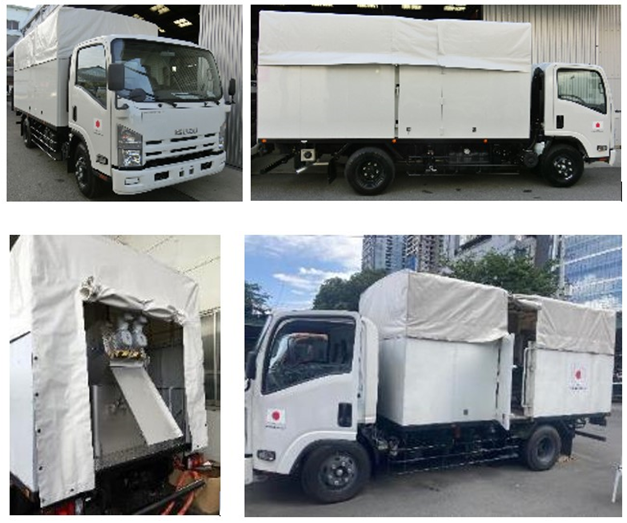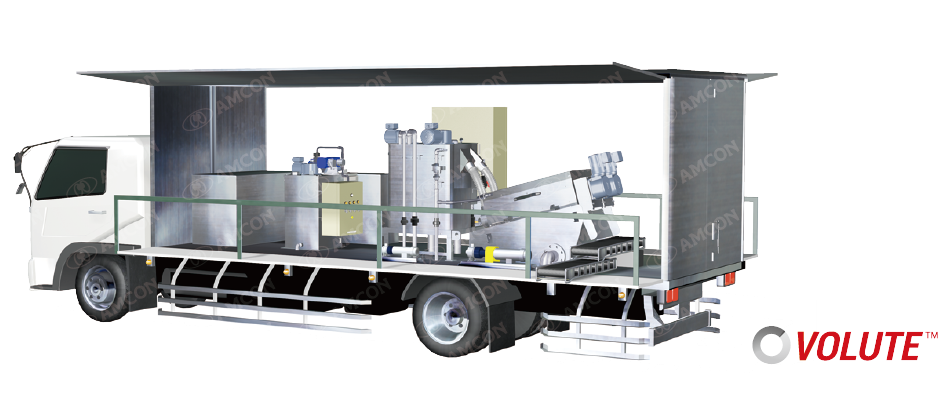
For those interested in learning more about mobile dewatering trucks, this article provides a detailed explanation, covering the basic mechanisms and types, as well as specific advantages and disadvantages. Additionally, we will also provide some crucial pointers for you to decide on the best option for your needs.
※This description is based on Japanese legal regulations. Please note that regulations may vary by country.
Contents
What exactly is a Mobile Dewatering Truck?
A mobile dewatering truck is a specialized vehicle designed to process sludge generated at small-scale wastewater treatment facilities, such as small sewage treatment plants, village drainage facilities, and communal facilities. These vehicles are equipped with devices that efficiently dewater sludge, allowing for quick processing on-site. They are also useful during emergencies, such as when wastewater treatment facilities cannot process sludge due to disasters. Typically, in the case of mobile dewatering trucks, dewatering machines such as the regular screw presses or multi-plate screw presses are used for the dewatering process.

Advantages of a Mobile Dewatering Truck
The primary advantages of mobile dewatering trucks are “cost efficiency,” “on-site efficiency,” and “processing capacity.”
Improved Cost Efficiency
Mobile dewatering trucks offer significant cost efficiency. Building a new sludge treatment facility will requires a substantial initial investment. However, using a mobile dewatering truck can significantly reduce these initial costs. They are ideal for handling sludge at multiple rural locations through mobile sludge processing.
On-Site Efficiency
These trucks are equipped with the necessary equipment and generators to start dewatering immediately on-site.
Processing Capacity
For our VOLUTE™ MV Series, the specific dewatering machine can be selected based on the sludge processing capacity.
- Processing capacity: Raw water, WAS (Waste Activated Sludge), coagulated sediment sludge, up to 90kg-DS/h.
For details on the MV Series, click here.
Disadvantages of a Mobile Dewatering Trucks
The primary disadvantage of mobile dewatering trucks is surrounding the “maintenance and management of the vehicle.”
Vehicle Maintenance and Management
Maintenance costs include taxes, insurance premiums, vehicle inspection fees, and, if necessary, parking fees. Additionally, fuel costs, replacement costs for consumables like tires, and repair fees are required.
How to Choose a Mobile Dewatering Truck and Points to Consider
Size and Capacity
When selecting a mobile dewatering truck, its size and capacity are important factors. The optimal model depends on the volume and type of wastewater being processed.
| Element | Points to Consider |
| Processing Volume | Check if it can handle the necessary sludge volume. |
| Site Space | Ensure the vehicle size fits the on-site space. |
| Mobility | Confirm if it can navigate narrow roads and rough terrain. |
Manufacturer and Model
It’s essential to compare different manufacturers and models prior to the final selection. Even with the same processing capacity, each manufacturer offers unique features and optional functions, making it easier to choose a model that best suits your site.
- Ease of Operation: An intuitive operation design is crucial.
- Maintenance Costs: Check the cost and the necessary frequency of replacing consumable parts.
After-Sales Service and Support
After-sales service and support are also critical points when selecting a truck.
| Service | Points to Confirm |
| Emergency Response | Can they respond quickly? |
| Regular Maintenance | Are regular inspection services available, and what do they include? |
| Technical Support | Is there adequate support from technicians? |
Driver’s License Requirements
The type of driver’s license required depends on the vehicle’s gross weight and payload capacity.
For example, for the MV Series by AMCON INC., a medium-sized license is required for the MV-1, while a large license is needed for the MV-2 and MV-3, in accordance with the amended Road Traffic Act (enforced on March 12, 2017).
| Model | Base Truck | Dewatering Capacity |
| MV-1 | 4-ton payload class (gross weight under 8 tons) | ~20kg-DS/h (~2.0m3/h) |
| MV-2 | 8-ton payload class (gross weight under 11 tons) | ~45kg-DS/h (~4.5m3/h) |
| MV-3 | 8-ton payload class (gross weight under 11 tons) | ~90kg-DS/h (~9.0m3/h) |
Conclusion
In this article, we introduced the advantages and disadvantages of mobile dewatering trucks. These trucks improve cost efficiency and site productivity at small-scale wastewater treatment facilities. Why not consider mobile dewatering trucks for your needs based on this article?